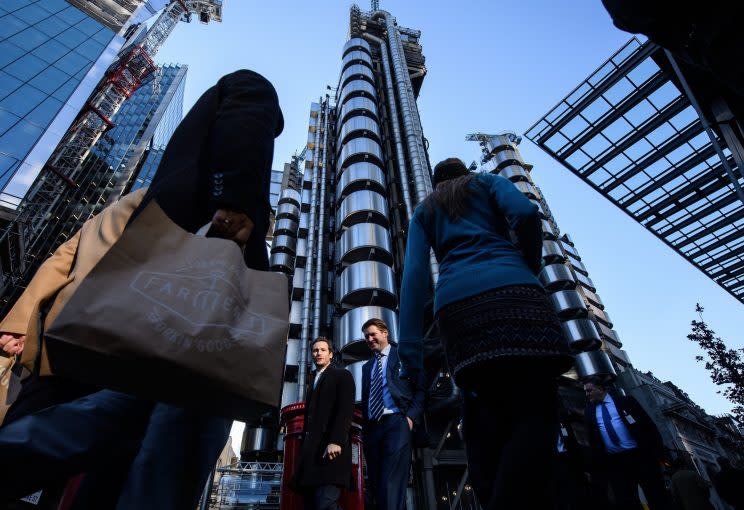What is euro clearing and why does it matter to the UK and Brexit?

Euro clearing has become yet another political ‘hot potato’ for the UK Brexit negotiating team to juggle.
While few ‘ordinary’ Britons will have heard of it, clearing is a multi-billion euro business (an estimated £792bn per day), and key to London’s position as a global financial powerhouse.
The European Union is suggesting companies operating in this key monetary area relocate to the bloc after Brexit – something London is very keen to avoid.
What is euro clearing?
It all centres on derivatives, or contracts, between two trading partners – whether that is bonds, commodities, currencies, interest rates, market indices or stocks.
MORE: EU Parliament negotiator demands Brexit clarity from Theresa May after botched election gamble
MORE: EU seeks post-Brexit powers over London finance hub
Derivative instruments are used by financial services companies to protect against damaging moves in interest rates and currency markets. Essentially, clearing houses – or central counterparties (CCPs) – act as the middleman, sitting between two parties that are moving millions of euros of business. They are tasked with managing the risk if one side defaults on payment. These agreements can stretch for months or even years.
Clearing stands between two sides of a transaction to ensure its safe and smooth completion.

Where does the UK fit in?
There are three clearing houses operating in the UK which are recognised by both the UK and the EU: CME Europe, a derivatives exchange and wholly-owned subsidiary of US-based CME group, the London Clearing House LCH Group, majority owned and operated by the London Stock Exchange Group, and the London Metal Exchange.
The UK is the largest “over the counter” (OTC) euro foreign exchange transactions market and the largest OTC interest rate derivatives market in the world. Around €1 trillion are exchanged in the UK every day, compared with €395 billion in the US.
In terms of interest rate derivatives, the UK has a daily turnover of €927 billion. London handles about three-quarters of all euro-denominated derivatives.
Why does it matter?
Brussels has fretted since allowing London to play a central role in euro clearing in the late 1990s that it lacks a certain amount of control over the sector. Now, with the UK set to leave the EU in 2019, those concerns have been heightened as Britain will be out of the EU’s regulatory reach.
It’s all to do with Brexit, then?
Certainly, most observers see this very much a political issue and little to do with finance.
The European Central Bank suggested in 2011 that clearing houses should be inside the eurozone if they handled more than 5% of a euro-denominated product.
Xavier Rolet, chief executive of the London Stock Exchange, said this week that forced relocation would create two pools of liquidity – a liquid “offshore” market outside the EU, and an increasingly “rump, illiquid and systematically more dangerous” market inside the bloc.
He said that the LSE supported another option being looked at by Brussels, so-called enhanced supervision, whereby the EU has a direct say in regulating a clearing house in London.
Miles Celic, head of lobby group TheCityUK, says any decision to strip London of euro clearing would be a political one, not a financial one.
So how is clearing regulated at the moment?
Clearing houses in the 28-member bloc are overseen by a college of regulators which consists of the CCP’s national authority, plus other bodies. But it cannot have representation from a body outside of the EU. So when the UK leaves the EU, Brussels is concerned that this huge London market will essentially be out of its control.
While the UK operates at the moment under EU rules, where it will be after Brexit negotiations are complete is up in the air.
If the UK is left to fight its own corner, it may be hampered by precisely the lack of EU regulation an oversight. Regulatory uncertainty could impact on the trust in London-based operators.
MORE: Finance firms stick to hard Brexit plans despite calls for softer EU break
Would there be a price to pay should clearing move out of London?
A report by consultants EY last autumn suggested some 83,000 jobs could go over the next seven years.
The direct economic impact of such a move would be limited, however. LCH Clearnet Group’s overall operating profit for 2015 was €78 million, from which the UK subsidiary had an operating profit of €63 million, and employs around 450 people. LCH Clearnet SA (a subsidiary based in France) had an operating profit of €28.8 million and has 168 employees.
What happens next?
The European Commission is expected to propose on Tuesday that firms deemed vital to the EU financial system be required to accept direct oversight by the bloc’s authorities, or be forced to move their operations to a location inside the EU.
Uuriintuya Batsaikhan, of the Bruegel think-tank in Brussels, says: “It is impossible to know whether the ECB will attempt to impose the ‘location’ requirement again or attempt to amend the Treaty on the Functioning of the European Union (TFEU) to specifically seek competences with regard to the securities clearing systems. However, it will be much harder for the UK to influence the course of actions if it is no longer a member of the EU.”

 Yahoo Finance
Yahoo Finance 
